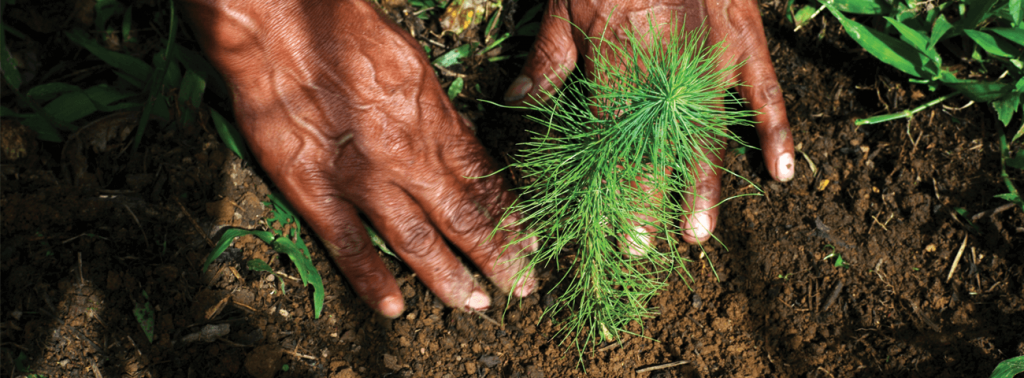A new publication unveiled by Fairtrade will help smallholder farmer organisations around the world navigate the complexities of human rights and environmental due diligence (HREDD) expectations.
Released this summer the guidebook, titled Implementing Human Rights and Environmental Due Diligence: Why and how to align your policies and processes with HREDD, is a global first that aims to strengthen the position of farmers and workers in global supply chains and arm them with the know-how to influence companies on HREDD practices and have an impact on how HREDD laws are written.
‘HREDD can greatly advance the livelihoods and other human rights of farmers and workers operating in global supply chains,’ explained Meri Hyrske-Fischer, Human Rights Expert at Fairtrade’s HREDD Centre of Excellence in Helsinki, Finland. ‘However, HREDD will not make much of a difference if the farmers and agricultural workers it’s designed to help are left disempowered and excluded from decision-making processes.’
‘With this guide, and the related trainings and workshops we will be implementing with farmer cooperatives across Africa, Asia and Latin America, Fairtrade now provides farmers with much needed support to make HREDD work for them,’ she added.
HREDD regulations are steadily gaining ground around the world as legislators look for ways to compel companies to proactively end human rights violations and environmental harm within their supply chains. In February 2022, for example, the European Commission presented its proposal for a European Union-wide HREDD regulation that urged large companies placing products on the EU market to reduce and remediate any serious negative impacts they or their supply chains have on people or the environment.
HREDD is a systematic process of managing adverse human rights and environmental impacts. It involves a company or organisation committing to respecting human rights and the environment; identifying the biggest human rights and environmental problems linked to its operations and value chains; taking action to address and remediate those problems; tracking their progress; and communicating about their work to key stakeholders.
However, value is often distributed unequally across many global supply chains leaving farmer organisations without the necessary resources to prevent and remediate human rights violations in their part of the supply chain.
‘In fact, international HREDD guidelines recognise that retailers, brands and trading companies need to participate in remediating violations they contribute to in their supply chains,’ noted Maija Lumme, Business Partnership Manager at Fairtrade’s HREDD Centre of Excellence.
‘Further, it is critical that companies and other actors looking to implement HREDD in their supply chains consult and support the people whose working conditions and lives they seek to improve. To raise women’s earnings, for example, it makes sense to ask what women farmers and workers see as their biggest obstacles and possible solutions. This cannot be emphasized enough.’
Although HREDD may be a foreign concept to the more than 1,500 farmer organisations in high-risk areas around the world that Fairtrade works with, compliance with Fairtrade Standards means that these organisations have nonetheless been implementing due diligence activities on human rights and the environment for a long time. In other words, HREDD work is well underway.
‘Many farmer organisations may not have heard of HREDD per se, but specific HREDD activities have long been familiar to Fairtrade producer organisations who have been complying with Fairtrade Standards requirements,’ explained Ms. Lilian Maina, Social Compliance and Risk Manager at Fairtrade Africa.
‘Risk assessments, the training of staff and farmers on environmental and social issues such as child labour, the development and implementation of policies on gender, child labour or forced labour – these are all part of HREDD, and many farmer organisations will be pleased to find out they’re already working hard on HREDD,’ Ms. Maina said. ‘The Fairtrade HREDD guide will now help them connect the dots between what farmer organisations have been doing and what is now increasingly expected.’
In addition, the Fairtrade HREDD guide, the first of its kind for farmer organisations, will help farmers and agricultural workers build upon their existing HREDD work and continue their human rights and environmental due diligence journey and the development of a full HREDD process.
‘At Fairtrade, we know that farmer cooperatives need to strengthen their HREDD work. We also know that all stakeholders, from retailers and brands to traders, must support farmers with the necessary resources to make HREDD happen,’ continued Ms. Hyrske-Fischer.
‘That’s why we feel this guide is the most direct route to delivering greatest impact: through pragmatic guidance, training, and advice that farmer cooperatives can use straight away in strengthening their own work and also in influencing global HREDD norms and practices.’
ENDS
